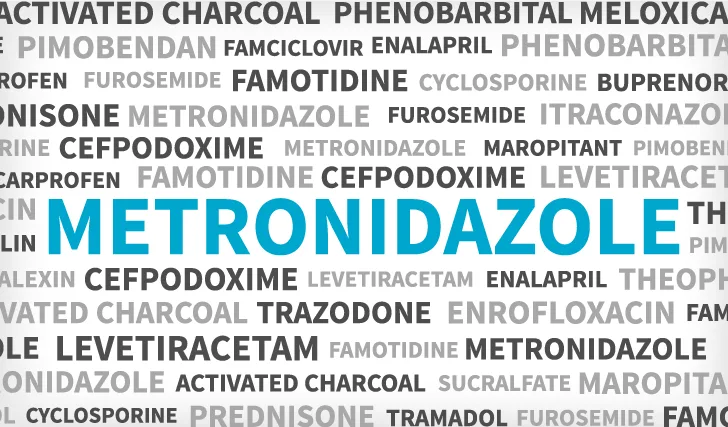Metronidazole for Dogs & Cats

Antibiotic, Antiprotozoal (Systemic Drug)
Prescriber Highlights
Injectable and oral antibacterial and antiprotozoal agent
Main side effects include neurologic disorders, lethargy, weakness, hepatotoxicity
Bitter tasting; may be more palatable when compounded
Uses, Indications
Used for treatment of Giardia spp in both dogs and cats, in addition to several other parasitic infections (eg, trichomonads, Balantidium coli) and anaerobic enteric and systemic infections
Commonly used for perioperative surgical prophylaxis when anaerobic infections (eg, colon, periodontal) are likely
Has some inhibitory actions on cell-mediated immunity that may play a role in its use for treatment of inflammatory bowel disease
Contraindications, Precautions, Warnings
Contraindications
Patients with a history of hypersensitivity to metronidazole or nitroimidazole derivatives
Precautions
Not recommended for use in severely debilitated, pregnant, or nursing patients; use with caution in patients with hepatic dysfunction
Warnings
Total daily dose should not exceed 65 mg/kg because of risk for neurotoxicity
Side Effects
Neurologic disorders, lethargy, weakness, neutropenia, hepatotoxicity, hematuria, nausea, anorexia, vomiting, and diarrhea have been reported in dogs
Neurologic toxicity in dogs may occur with acute high doses but is more common with chronic moderate- to high-dose therapy
Vomiting, inappetence, and hepatotoxicity can occur in cats undergoing metronidazole therapy
Central nervous toxicity, although rare, can also occur in cats
Drug Interactions
Cimetidine may decrease the metabolism of metronidazole, increasing the possibility of dose-related side effects
Cyclosporine levels may increase when combined with metronidazole therapy
Fluorouracil (5-FU) may result in increased 5-FU levels and possible toxicity
Phenobarbital or phenytoin may increase the metabolism of metronidazole, decreasing blood levels
Metronidazole may prolong prothrombin time in patients receiving warfarin or other coumarin anticoagulants
Monitoring
Clinical efficacy, side effects
Client Information
Clients should pay close attention to any neurologic abnormalities
Dosage Forms
Metronidazole oral tablets: 250 mg, 500 mg
Metronidazole oral solution: 5 mg/mL
—Compiled and summarized from Plumb’s Veterinary Drugs by Shannon Palermo, VMD
Information about metronidazole for dogs and cats was adapted from Plumb’s Veterinary Drugs. Further details and more therapeutics can be found with a subscription at plumbsveterinarydrugs.com.